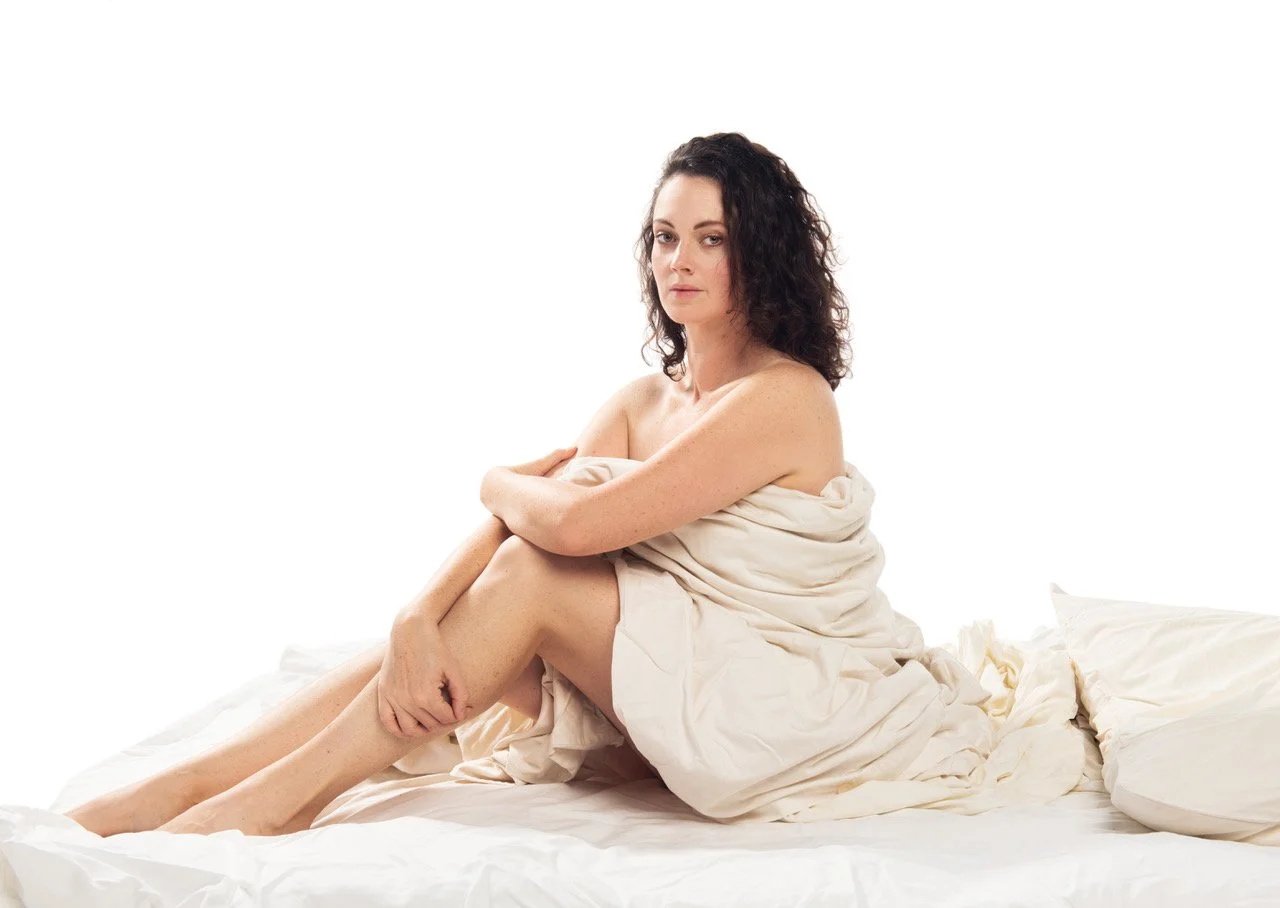Theatre review: Bunny's journey down the rabbit hole of female desire is well worth taking
Emma Slipp and Lucy McNulty find complex layers in The Search Party’s story of self discovery and the struggle against society’s sexual norms
Emma Slipp in Bunny, at the Anvil Centre. Photo by Emily Cooper
The Anvil Theatre presents The Search Party’s Bunny to February 18
TO PUT IT BLUNTLY, Bunny’s titular character exhibits traits of her namesake animal. She’s flighty and enjoys sex. She serves as her own narrative’s perfectly elusive white rabbit, one to follow down deep burrows of self-discovery, desire, and the societal norms that weigh on them.
Bunny (Emma Slipp), born Sorrel to hippie, academic parents, and carrying an innate awkwardness and profound love for Victorian literature, often found herself on the fringes of her small-town Ontario school. That all changed when puberty hit and bestowed upon her the peculiar status of “hot dork”. Newfound attention from boys and ensuing sexual experimentation thrust her into the kind of social ostracization reserved for those who transgress the unspoken and repressive norms around teenage-girl sexuality.
Canadian playwright Hannah Moscovitch’s work, returning after a premiere at The Cultch in 2022, centres around whether things improve for Sorrel after high school. The show dives into the protagonist’s formative relationships (in all of their erotic allure and messy proximity), gradually revealing a journey toward acceptance away from past rejection and unchallenged conventions. Through monologues and flashbacks, we witness the awkward, curiosity-driven high-school romance, the pivotal bond with Maggie, her first female friend—who generously gifts her the nickname; a carnal affair with a university lecturer; her pragmatic marriage; and a flirtation with a young family friend who intellectually connects with her on a deeper level than anyone else.
A big appeal to Bunny is her intelligence, which simultaneously draws us to her while also creating a sense of isolation. She navigates her rich inner world with an analytical approach, readily dissecting people and situations. After an encounter with the emotionally unavailable married professor (Jay Hindle), Sorrel, having just climaxed a few seconds ago, pauses for a brief moment and then casually blurts out “You know, in a few years you’ll probably seem like a creep.”
This scrutiny is even more cutting when Bunny turns it inward. Exuding equal measures of destructive self-doubt and liberated sensuality, Slipp crafts a sensitive vision of female longing and alienation. Coupled with director Mindy Parfitt’s atmospheric touch, the complex protagonist’s distinct allure grows more captivating and human as the play goes on.
Elizabeth Bennet-like witty retorts and dry humour might distract but can’t conceal Bunny’s emotional remoteness, something even her best friend Maggie struggles to access. We might gain insight into her internal struggles, but the show meticulously maintains her at a distance. Sorrel’s addresses to the audience, spoken in the third person, echo as though she’s discussing a heroine from one of her beloved George Eliot novels. Slipp’s voice, seemingly dropping an octave, maintains a flat effect that’s instantly noticeable. The inexpressive style strikes a strange, interesting balance between humour and sadness, particularly when she prefaces revelations with phrases like “Sorrel should also admit…” or “The trouble with Sorrel is…”.
To cut through some of the dissociated headiness is the receptive Maggie (Lucy McNulty, new to the role in this production). When she first steps onto the stage, her voice actually stops one of Sorrel’s self-critical musings in its tracks, and from that moment on she serves as the anchor that keeps her friend tethered before she drifts too far away—her body dangling from her mind.
Moments of true intimacy are more rare than the play’s frequent depictions of sex, and the marked distinction between the two is most relevant and touching when it involves Maggie and Bunny. McNulty’s performance is emotionally precise and crucially grounding; “At some point I need closeness,” she demands from Bunny.
Amir Ofek’s set, Itai Erdal’s lighting, and Alessandro Juliani’s sound design build up both a seductive and emotionally obstructive atmosphere. The cocoon-like haze of warm, golden light envelops Sorrel’s monologues, which are cued in by wispy musical interludes. The male characters in the play (all strongly performed by Hindle, Dylan Floyde, and Kyle Jespersen) navigate through tall, imposing wooden screens to approach Sorrel.
Throughout time shifts and scene transitions, they add and remove layers of clothing, like a bulky sweater or a denim jacket, to her unchanging cherry-red, floral dress—a gesture that carries intriguing weight.
It’s a real treat to see all of the elements of The Search Party’s production of Bunny work in synchronicity to create a formally compelling depiction of one woman’s innermost desire, loneliness, and self-denial. Catch it while you can.














